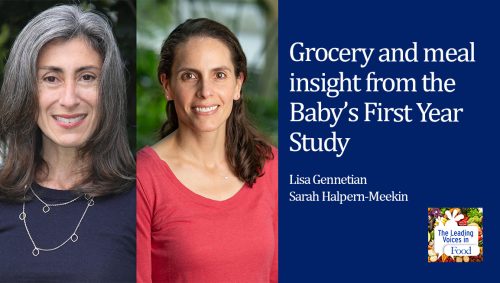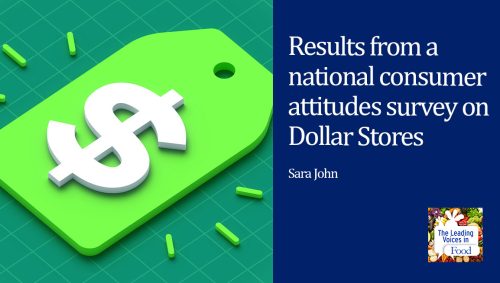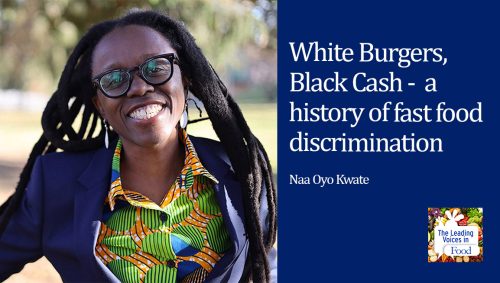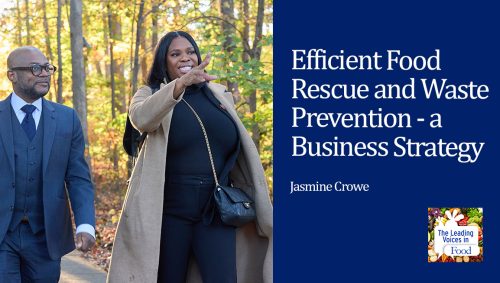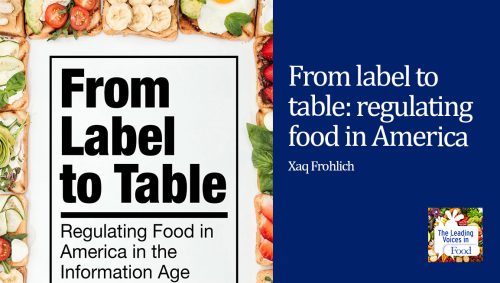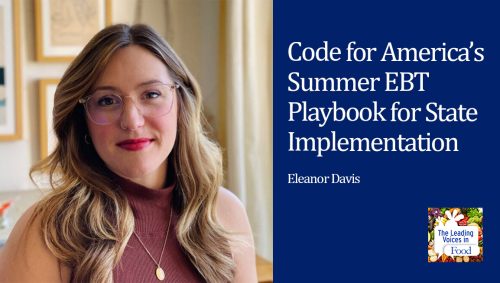The Leading Voices in Food
E182: Memoir and Marion Nestle – Slow Cooked
Pioneer, path breaker, field builder. These are all descriptions that apply to our guest today, Dr. Marion Nestle. Marion Nestle is the Paulette Goddard Professor of Nutrition, Food Studies, and Public Health emerita at New York University. She has been a major force in food policy for decades, partly because she is a brilliant communicator and a prolific author. Her groundbreaking book, “Food Politics,” has been published in several editions. Another book, “Unsavory Truth: How The Food Companies Skew The Science of What We Eat,” is a classic. And this just begins the list. But today we’re talking about Marion’s newest book, which is a memoir called, “Slow Cooked: An Unexpected Life in Food Politics”. It offers an unprecedented look into the life, the thinking, and the passions of one of the top figures in the field.
Subscribe: Apple Podcasts | TuneIN | Google Podcasts | SoundCloud | PocketCasts | Radio Public
Tags: Diet & Nutrition | Equity, Race & Food Justice | Food Policy | History & Food |
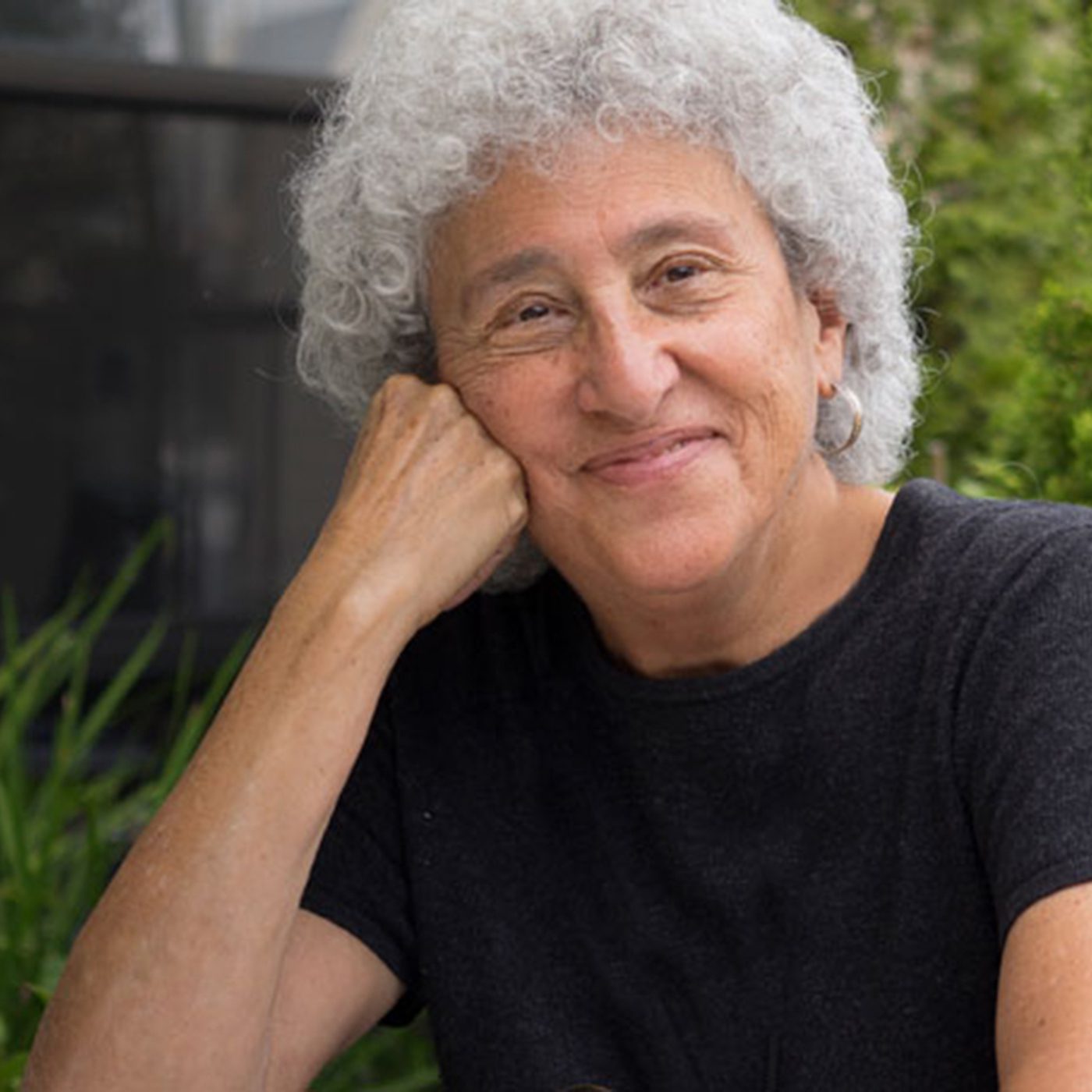
Marion Nestle is Paulette Goddard Professor of Nutrition, Food Studies, and Public Health, Emerita, at New York University, in the department she chaired from 1988-2003 and from which she retired in September 2017. She is also Visiting Professor of Nutritional Sciences at Cornell. She holds honorary degrees from Transylvania University in Kentucky and the Macaulay Honors College of the City University of New York.
She earned a Ph.D. in molecular biology and an M.P.H. in public health nutrition from the University of California, Berkeley. Previous faculty positions were at Brandeis University and the UCSF School of Medicine. From 1986-88, she was senior nutrition policy advisor in the Department of Health and Human Services and editor of the 1988 Surgeon General’s Report on Nutrition and Health. Her research and writing examine scientific and socioeconomic influences on food choice and its consequences, emphasizing the role of food industry marketing.
She is the author, co-author, or co-editor of fourteen books, several of them prize-winning, most notably Food Politics: How the Food Industry Influences Nutrition and Health (2002); Safe Food: The Politics of Food Safety (2003); What to Eat (2006); Why Calories Count: From Science to Politics, with Dr. Malden Nesheim (2012); Eat, Drink Vote: An Illustrated Guide to Food Politics (2013); and Soda Politics: Taking on Big Soda (and Winning) in 2015. She also has written two books about pet food, Pet Food Politics: The Chihuahua in the Coal Mine (2008) and Feed Your Pet Right in 2010 (also with Dr. Nesheim). She published Unsavory Truth: How Food Companies Skew the Science of What We Eat, in 2018. Her most recent book, with Kerry Trueman, Let’s Ask Marion: What You Need to Know about the Politics of Food, Nutrition, and Health, was published in September 2020. Her forthcoming book with University of California Press is a memoir to be published in 2022.
Interview Summary
You’ve had an amazing journey to get to where you are. People know a lot about what you’ve done at the point where you became an academic started publishing, and things started showing up in the field, but an awful lot happened before that that led up to the academic part of your life. I’d like to have you tell us a little bit about that, if you would.
I called the book “Slow Cooked,” because it took me forever to develop a career. In looking back on it and in writing this book, I realized that I was a woman of my time. I grew up in the 1950s when expectations for women were extremely low. Women weren’t expected to do anything except get married and have children, which I did. I was fulfilling societal expectations. I worked very hard and was pretty unhappy about all of that because doors seemed so closed. I grew up in New York, and my family moved to Los Angeles when I was 12. I went to an academic high school where everybody went to college, but you were not expected to do anything or to use your college education to create a career. You were expected to find a husband, get married, and have children, and that is what I did.
So then what led you from that to the academic world?
Well, I wasn’t very good at being a housewife, and I found it hard to be home with young children all the time. I had a lot of growing up to do, and my poor kids and I grew up together. But I stayed home with the children for a couple of years and it was not a happy experience. I think that was the time in my life when I was close to being clinically depressed. I had friends who said, “You have just got to go back to school.” Well, I didn’t know what else to do. I thought that was probably good advice, I had very good grades as an undergraduate. So, I was able to get into a graduate program and went back to school when my children were six months and two years old and somehow survived that. Looking back on it, I don’t know how I did. That was the beginning of a long, slow progress towards a career. I went to graduate school because I wanted to make sure I had a job at the end of it. I trained to be a laboratory technician and got a job when I finished college. But even in graduate school, I didn’t take what I was doing very seriously. I wasn’t treated as if I was a serious student. I was told that the only reason they were giving me a fellowship was because no men had applied that year. I thought, “Well, nobody’s going to take me seriously, I’m not going to take myself seriously either. I’m just going to do this.” And at the end of it, I knew I would have a job.
So what happened that got you interested in academic life, and food issues in particular?
The transition was on my first teaching job. I went to Brandeis University as a postdoctoral fellow. By that time I was divorced and remarried. My husband had a job in Boston. I got a job as a postdoctoral fellow with Brandeis. That led to what I call the swimming pool epiphany, which was a realization in a moment that I could not have an academic career as a bench scientist and handle two young children at the same time. There were women who could do that, but I was not one of them. I was a bench scientist, and working in a developmental biology laboratory. My kids had swimming lessons at Brandeis on Saturday morning. I stayed home with them, because my husband had his own job. He was an assistant professor at Harvard, and he had to work on weekends to keep up with his work. One day there was a much longer swimming lesson for some reason, so much longer that I thought, “Well, I’ll just go to my lab. And there won’t be anybody there, and I might actually be able to get a little work done.” I walked into my lab on a Saturday morning and everybody was there, everybody! The lab director, his wife, the lab technician, the graduate students, the other postdocs, everybody was there except me. I didn’t even know that people were there on Saturday morning. I thought, “Oh, okay, this is why everybody treats me like I’m not getting any work done.” And, “Oh, okay, THIS IS WHY I’m not getting any work done.” That was the end of my lab career. I started looking for a teaching job right away. I knew I couldn’t do it. So I took a teaching job at Brandeis, and learned how to learn, which was very useful. On my last year at Brandeis, I got handed a nutrition course to teach. As I like to describe it, it was like falling in love and I’ve never looked back.
That is so interesting. And What happened after Brandeis?
Well, after Brandeis, my husband got a job at UCSF in San Francisco. I went along as an accompanying spouse, not really realizing the terrible political position that I was in – because I had gotten a job because I was my husband’s wife. The job seemed fantastic, I was a halftime associate dean for human biology programs, and then the other part of my time I was teaching nutrition to medical students. I was able to keep that going for eight years, until it and the marriage fell apart at the same time. Then I went to public health school, and actually got credentialed in nutrition. I did a master’s in public health nutrition at the University of California, Berkeley. And then, when the UCSF job ended, I went to Washington for two years with a very fancy title: Senior Nutrition Policy Advisor in the Department of Health and Human Services. There I edited the 1988 Surgeon General’s report on nutrition and health.
That was a landmark report. But there’s a question I’m dying to ask, what was it about nutrition that made you fall in love with the field?
Oh, it was so much fun! It was so much more fun than molecular biology and cell biology. For one thing, the papers were so much easier to read. When I first started teaching undergraduate nutrition, I could give undergraduate students original research papers in nutrition and they could critically evaluate those papers – almost without knowing very much about science. They could see that the number of study subjects was very small, that the studies weren’t very well controlled, that there were all kinds of other factors that could’ve influenced the outcome of those studies. I thought this is just the best way of teaching undergraduate biology I could think of, because everybody could relate to it in a very personal way. It was really fun to teach. Still is.
You’re a very gifted communicator. So I can imagine how you would enjoy teaching. You’ve had an interesting journey through the nutrition field itself, having started at kind of the basic level, with a biological background, teaching about research papers in the field, and then transitioning to having this major focus on the policy side of things. I’m imagining that time in Washington you just discussed was pretty influential in that. Is that right?
Oh, it certainly was. You know, I took the job because I was told, “If you’re interested in nutrition policy, this is the place to be.” I was in the Office of Disease Prevention and Health Promotion, which is responsible for a large number of very important public health initiatives. And I thought the Surgeon General’s report was really worth two years of my time. I ended up writing most of it, and certainly editing a great deal of it. It was an education in how politics works. I had come from Berkeley, where we didn’t really understand the difference between Republicans and Democrats. We thought both of them were mainstream, and didn’t really get it. Oh, I learned the difference very quickly. It was an education in how Washington works; what you can say and what you can’t say; how you get things done politically; how you try to work across bipartisan lines, but how difficult that can be. Also, I met people in agencies who ended up being extremely helpful in later stages of my career. If I had a question, I knew who to ask. I was on committees, I was just really involved in a great deal of nutrition-policy activities in Washington during that two-year period. It was a very steep learning curve, and one that I consider immensely valuable.
And was it during that period where you came to develop a richer view of the influence of food industry on the way food policy decisions are made?
On the first day of my job in Washington, I had just arrived from California. The director of the office I was in explained that even if the research showed that eating less meat would be better for health, the Surgeon General’s report could never say “Eat less meat.” Because that was a politically impossible statement. The Department of Agriculture would complain to Congress, and the report would never be able to come out. That was, as I am fond of saying, no paranoid fantasy. It was absolutely true. An enormous part of my job in Washington was to fend off the Department of Agriculture official who was most interested in making sure that the Surgeon General’s report did not say one negative word about red meat. And of course, it didn’t. It said, “Eat less saturated fat,” and you were supposed to know that saturated fat is a euphemism for meat.
The role you played was really phenomenally important, and that document that you worked two years on was really very important at the time. So what did you do after that?
Well, I discovered quite early in my time in Washington DC that I was not suited for a Washington DC career. I tend to be outspoken and say what I think, and that’s really not acceptable in those circumstances. I was constantly getting my boss in trouble for things that I said. I discovered quite quickly that in addition to the Republican and Democrat split in Washington, there was a split between people who liked New York better than Washington, and those who liked Washington better than New York. I quickly discovered that going to New York would be going home, in a sense. I started looking for jobs in New York right away. After a year or so, the job chairing the Home Economics Department at NYU came up. I applied for it, and happily got it.
Boy, that term – home economics – really brings you back, doesn’t it?
It does, and I thought it was hilarious, because here I was with a degree in molecular biology, and another one in public health nutrition. I was coming to chair a Department of Home Economics. Couldn’t believe they still existed. I had been hired to change the department into something more appropriate for the 20th, if not the 21st century. And I didn’t realize how hard that was going to be. But it was actually the only job I got, so I was happy to do it. It was in New York; it was in The Village; it was at NYU. Which was, at the time, kind of a third-rate institution, but with a commitment to improve dramatically. Which it did very, very quickly, over the next several years. It was very exciting to be part of that development. And of course, eventually the department shifted from home economics to food studies and nutrition, which is what it is now.
When you bring up home economics, it reminds me of being in high school in South Bend, Indiana, where the girls went to home economics classes and the boys went to shop class and learned to do woodworking and things. What a difference there is today.
I was happy to learn how to cook. I think they should bring cooking back. It’s a great thing to know how to do, and it certainly improves the quality of food that you eat at home. That’s where I learned to cook – in home economics, in junior high school. But the home economics department that I inherited had 25 different home economics programs run by five faculty. It was so absolutely amazing, and there was much work to be done to kind of clean up some of that. Fortunately, I had a lot of administrative help, because the university was improving rapidly, and it wanted that department to improve too.
You’re so right about cooking and how important the skill it is. I do a lot more cooking these days than I do woodworking or using a drill press. I wish I could have gone with the girls into that home economics class back then.
Well, I wish I could’ve gone to the shop, I would’ve loved to know how to fix cars.
Ahh, there you go. So at NYU, you created, I think, what was the first university program in food studies, is that right?
The first one called “Food Studies.” There was a program at Boston University in gastronomy that had been kicked off by Julia Child and Jacque Pepin, but I knew that gastronomy would not work at a rapidly-improving university that took its academics very seriously. But there were, at NYU, a great many programs with “Studies” in their title. And I thought if we had food studies, we could get away with it. And we did. We were very, very fortunate in being able to do that, because a program in hotel management that the department ran was being taken away from us and transferred into another school. And it was an extremely lucrative program, and everybody felt very sorry for losing the income from that program. And so, when we came up with the idea of food studies, once people got over the initial question, “What’s that?” And we were able to explain to them that food is a multi-trillion-dollar-a-year industry; the major public health problems in the world are connected to food; agriculture is connected to food; climate change is connected to food – in fact, practically any problem you can think of is connected to food in some way. Then we were permitted to go ahead and do that. We were very, very fortunate in creating a new field, because the “New York Times” wrote about the program the week after New York State approved it. The most amazing thing happened! We had people in our offices that afternoon holding up copies of the clipping and saying, “I’ve waited all my life for this program.” In a sense, we created the program that many of us wish we could’ve taken when we went to school, because it’s a program about food and culture. It now has agricultural components in it, although it didn’t at the beginning, but it does now. It’s kind of food and everything. Our students love it, they all come into the program wanting to change the world through food, and I’m greatly in favor of encouraging them to try to make the world better through food. I think it’s a great way to do it.
I found the same thing in my teaching. The students are so keen on these issues, they get more sophisticated and knowledgeable every year. Interest in food and climate change, like you said, is just booming. And boy, it’s really heartening to know that there are so many young people interested in taking on this issue. And thanks to you and others who started those early programs that really paved the path for everything that exists today. Let me ask you about your book “Food Politics”, which is really a classic. What inspired you to write that?
I had gone to a meeting at the National Cancer Institute in the early 1990s, and it was about behavioral causes of cancer, mostly cigarettes. This was my first meeting with the main anti-smoking physicians and scientists who were taking extremely activist positions against smoking. They did slideshows, and the slides showed cigarette-company marketing in remote areas of the world: the jungles of Africa, and the high Himalayan mountains. One of the presentations was about marketing to children, and showed pictures of the Joe Camel ad everyplace where kids hang out. I was kind of stunned by it. Not because I didn’t know that cigarette companies marketed everywhere, and marketed to children. I did know those things, but I had never paid any attention to it. I had never systematically thought about it. Cigarette advertisements and advertising was so much a part of the landscape at that time that it was unnoticeable. It just kind of disappeared into the woodwork. I walked out of those presentations thinking, “We should be doing this for Coca-Cola!” We nutritionists should be looking at the companies that are marketing products that are not particularly healthful, and looking at how they’re doing it. So, I started paying attention. I started looking at food-industry marketing, fast-food marketing, soda marketing everyplace I went. And I started writing articles about it. In the late 1990s, I had a sabbatical coming up, I needed a sabbatical project, and by that time I had figured out that NYU valued books. I had been trained in molecular biology, where the only thing that’s valued is original research in very prestigious journals. But NYU values books, it’s very humanities-based. So, I thought I could take those articles and put them together into a book. That’s where “Food Politics” came about. It was a little bit more complicated than that, but that was basically the origin of “Food Politics”.
It is one amazing book, and it had so much influence on generations of students, and researchers, and advocates. And I thank you for writing it. It really has had a big impact.
Well, thank you for that. I have to say, I thought I was just stating the obvious.
Well, obvious to you, maybe, because you had the insight to look into these things before other people did. You really were a pioneer there. A lot of people believe that the job of an academic is to do their research, do their scholarly work, do their teaching, and then that’s it. Not to go out and try to change the way the public thinks about things, talk to the press, try to change policies, and do things like that. The thought is, once you stray into that territory, you’re biased toward a certain point of view and you lose your objectivity as a scientist. Now, I certainly don’t believe that’s the case, and boy, if anybody epitomizes that sort of philosophy, it’s you. How did you sort that through in those early days, as your work was moving into the advocacy arena?
Well, I think there were two things that happened. One was that I went into a department that did not have laboratories. So laboratory science was out of the question. I had to find something to do as an academic where I could publish in scholarly journals. And yet, I wasn’t doing original kinds of research, so I had to solve that problem. But the other was the miracle of NYU: they hired me as a full professor with tenure. I had tenure! I could do anything I wanted without fear of reprisals, or without fear of being fired because I was saying something that would offend someone. I have to say, never in my 30 years at NYU did anybody ever suggest that I keep my mouth shut. So it was absolutely the right place for me, and, I guess, the right time. But I had, I guess, they are biases. I had them for the beginning. I think it would be better if people ate more healthfully. I think it would be better if we had a food system that was better for climate change. I think it would be better if people ate diets that reduced hunger, and reduced their risk of chronic disease. I think those are values that are really important. To be able to do work that promotes those values made perfect sense to me. You know, I realize that I’m looked at as incredibly biased. I never get appointed to federal committees, and I have not been invited to the forthcoming White House conference, because I’m considered much too controversial. I’ve always found it ironic that people who work for food companies or who think that food-company marketing is perfectly appropriate are not considered biased. That’s the world we live in.
You know, it’s interesting how the academic world construes the concept of impact, and journal articles, and how many times people cite your articles. The outside world might look in on that definition of impact and just think it’s ludicrous. You think of impact in a different way, and I do as well. If you’re able to harness the work that occurs in the academic world in order to create the kind of social changes that you’re talking about you really are kind of maximizing the potential of what exists inside the academic world. Do you agree with that?
Oh, absolutely, it’s publish or perish, and I quickly discovered that food studies was a wonderful umbrella for the kind of work that I wanted to do. And it valued books, it values articles, opinion pieces. I mean, the way I describe my work is I write heavily-footnoted editorials. These are opinion pieces that are backed up by large amounts of science. I think that’s a valuable contribution. I’m not able to measure the kind of impact that I have. I have no idea what it is, and I don’t know how to measure it. But I’m doing the kind of work that feels good to me. I’m doing work that I feel good about and I feel is worthwhile. I hope that other people will pick it up, and that students will follow in footsteps. And one of the reasons for writing the memoir was to encourage students, no matter what field they’re in, to get some idea that they can do these kinds of things, it’s okay. You can get paid for it!
That’s not to mention changing public opinion or putting pressure on political leaders to do things outside of industry influence, and things. You know, it reminds me of an op-ed you and I wrote together in the “New York Times” some years ago, on the World Health Organization and the stance it was taking on sugar. Those things need to be made public, people need to know about those. And sometimes academics are in a pretty good position to highlight some of those really important issues.
Oh, absolutely, and all of that research skill that we have, all of those references and citations give a credibility to the kind of work that we do that is pretty unimpeachable. You know, I’m often attacked for my opinions. But never on the research that backs them up, which is kind of interesting. You may not like what I say, but I’ve got evidence to back it up.
Yes! Speaking of attacks, over the years, I’ve had so many of these sort of things. Some really nasty and threatening and some a little more humorous. I remember somebody once sent me a letter that said they wished a pox on my house. I wasn’t sure what I was to do with that. Like, I mean, should I go to Home Depot and buy a pox detector? I didn’t really know what to do. Heck, you must’ve had a ton of that kind of stuff. Has that ever bothered you?
Well, you would be amazed at how little of it I’ve gotten. I mean, there was one right at the beginning when “Food Politics” came out, there were a lot of attacks. “Doesn’t she know anything about personal responsibility,” and “Who is she to tell people what to eat,” and that kind of thing. And then the famous letter from a lawyer saying I maligned sugar by saying that soft drinks contain sugar, when I, of all people, should’ve known that they don’t contain sugar, they contain high-fructose corn syrup. Which I thought was hilariously funny, because high-fructose corn syrup is a form of sugar. But nothing ever came of it. I’ve heard remarkably little overt criticism or that kind of thing. What I have heard from people is I talked to one person who said he was hired by a soda company to track every single thing I was writing and then develop positions that the soda industry could use to refute what I had said. But I didn’t know anything about that until that confession later on. I was kind of amazed. He got paid to do that! Yeah, I thought that was pretty good.
That’s so interesting, so you’re creating jobs. Back to that time you were in government, working on the Surgeon General’s report, you were noting a lot of influence by the food industry on nutrition guidelines, nutrition policies, etc. If we fast-forward to today, do you think nutrition guidelines, nutrition policies, are less influenced by the food industry?
Absolutely not. Of course they’re still influenced. You can look at it in the dietary guidelines. They still talk about salt, sugar, and fat. They don’t talk about the foods that those substances come from. They’re still very cautious about advising less of any particular agricultural product, because the pushback is enormous. The meat industry is enormously influential over government policy. I mean, we have government agencies that are captured by corporations. We see this in many, many fields, but it’s certainly true in food. Everybody is worried about the FDA these days because of its cozy relationships with food companies. I just did a blog post this week on user fees. I don’t think the FDA should be getting its money for doing inspections of food corporations from the corporations it’s inspecting. They can’t possibly do that in an independent way. The Department of Agriculture has long been infamous for working for the meat and dairy industries. The food industry likes the perks it gets, doesn’t want them changing, and it uses the political system in the way that all corporations use the political system. I think there’s more recognition of food-industry influence over what we eat and how we eat, and that’s very gratifying.
Are there things you think could be done to lessen this influence, if you could wave the magic wand?
Yes, get rid of Citizens United to start with, so that corporations can’t buy elections. I think there’s a lot we could do. I think we need an agricultural system that is focused on public health, not on growing commodities that feed animals and fuel automobiles. I think one of the greatest travesties in the food system is that 30 or 40% of United States corn is used to make ethanol. That’s just shocking. In a world in which food is a really big issue, we should be growing food for people, not for automobiles, and not nearly as much for animals. You know, and I think there’re all kinds of policies that would promote public health in a way that we really need promoting. We need universal school meals; we need a healthcare system, that would be nice; and we need an agricultural and food system that is focused on reducing hunger and reducing chronic disease, particularly obesity-related chronic disease, which the government doesn’t want to touch. Because touching it means putting some limits on what food companies can do. I don’t think that food companies should be permitted to market junk food, especially to children.

